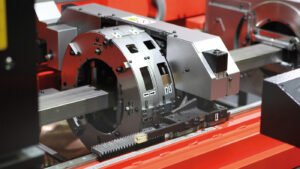What Is AI?
Artificial Intelligence, AI for short, is intelligence in machines rather than humans. Any system that can make decisions based on a perceived environment is AI.
AI is very widely used, perhaps more than most realise. When watching shows on Netflix, an AI program learns what you like to watch and will suggest shows for you. The same is true for YouTube.
In 1997, IBM’s Deep Blue AI beat the reigning world chess champion in a six-game match. With a score of two to Deep Blue, one to the champion and three draws, Deep Blue would become the first computer program to beat a chess champion (source). A great example of how AI can further the human race, and a huge milestone for the AI industry.
The Beginning Of AI
Alan Turing, a British Mathematician, would pose what is known as the Turing Test in 1950. This test was based on a game people enjoyed at the time. A man and woman would be in separate rooms while the player asks the two questions. They would answer through typewritten notes. The player aimed to guess who is the female and the male. The male and female would try to trick the player into guessing incorrectly. The Turing Test follows this concept, but the man is replaced by a computer. The player would then have to guess which is a human and which is a computer. Should the player not be able to tell which is which, the computer would be considered to be thinking.
While there is no AI that can pass as human yet, the Turing Test began the AI industry. Our definition has widened since Turing’s massive contribution, but the Turing Test has remained a much-discussed benchmark for our progress in the field.
How Can AI Help Manufacture?
AI is becoming increasingly popular in manufacturing, with a wide range of applications proving to be beneficial. AI has been implemented to varying degrees by several large scale manufacturers.
A currently much-discussed application is generative design. Generative design is a design process that uses AI to iteratively produce designs that meet a set of specifications. As the designs are produced, they are fine-tuned by a designer. This designer is not necessarily human and can be an AI program. This fine-tuning leads to better-defined specifications, to which more designs are produced. General Motors and Autodesk have teamed up to utilise generative design in their development of future vehicles. This technology holds great potential to redesign parts to be simpler and lighter (source).
BMW Group’s Dingolfing plant has employed an AI application for quality inspections. In the final inspection area, an AI application compares the vehicle order data to a live image of the model. If these don’t match, the inspection team are alerted. BMW has seen a reduction in pseudo-defects or false positives. This leads to better production efficiency as fewer vehicles are incorrectly failing quality inspections (source).
Making The Change
The UK Government has set out a £1billion sector deal to push the country’s R&D forward and, hopefully, bring the UK to the forefront of AI. They describe creating an economy that can use AI as “one of the greatest opportunities of our age” in their paper on the sector deal (source). This deal indicates a commitment from the government and several AI industry leaders to not only push R&D but also promote the adoption of AI.
Through surveys, MakeUK has found that 58.2% are aware of the benefits AI could bring to their business, but only 23% of manufacturers are using AI. This shows over a quarter of the survey respondents have decided against the use of AI, despite knowing it will help (source).
Why aren’t more businesses adopting AI? A list of possible reasons exists. There may not be available resources to allow the adoption of this technology. Discomfort due to lack of understanding may be a culprit, it’s difficult to trust what isn’t understood.
As more and more businesses adopt AI, they could share their experience online. This way, other businesses can read about their experience and build a better understanding of how the technology can be utilised in their situation. This would work to reduce the lack of understanding preventing adoption.
While AI might not be of use to some, it is important to continually evaluate the potential of the technology. AI, naturally, should only be adopted when economically viable, and only when applied to the business needs. However, with the UK’s heavy development of technology and the government’s push, there are ever-increasing opportunities to improve business with AI.







